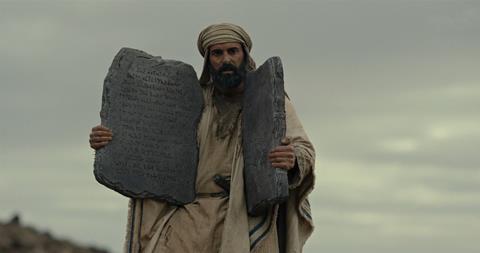The new series on the Israelite’s escape from Egypt is not perfect, says Tim Bechervaise. But it did inspire him to take a closer look at a Bible story many of us are overly familiar with. And that can only be a good thing

Isn’t it funny how adaptations of the same story can wildly differ and prompt very different reactions? Watching Testament: The Story of Moses, the new three-part series on Netflix, I turned to my wife and said: “It’s not quite the direction taken by The Prince of Egypt: The Musical!”
In the latter (spoiler alert!), Pharaoh and Moses gloriously unite as the Hebrews begin life away from the clutches of the Egyptians, helping provide the rousing and emotional climax befitting of a musical. Netflix’s take on the story, which is part documentary and part drama, avoids stretching the truth in the same way – and it leaves a different impression.
The Bible – or not?
Testament does not draw from an exclusively Christian tradition. From the start, Moses is acknowledged as a key figure in the three Abrahamic faiths: Christianity, Judaism and Islam. Consequently, interwoven among dramatic reconstructions of the story are insights from academics and leaders of all three faiths, including references about Moses in the Quran that are not in the Bible.
The Exodus story foreshadows the deeper work of Jesus in rescuing us from the slavery of sin
This may sound alarm bells for some Christians, but it shouldn’t be a barrier to watching it, albeit with discernment. The insights do not detract from the overall story, or the characters of key figures. In some cases, they shed an intriguing light on a familiar story, including a deeper look at some of the wording used in the Midrash (a Jewish form of literature that elaborates on some Biblical texts).
A common trait in all contributions is not just what Moses’ story meant originally but what it means for us today. It makes for some helpful devotional reflections, such as how we can remain enslaved mentally to our own Egypt despite being freed physically.
Relatable Moses
The series’ strongest feature is the depiction of Moses, portrayed with the vulnerability and humility often spoken of in sermons. His struggles with public speaking and anger are given prominence, showing that this was an ordinary man tasked with an extraordinary task. Meanwhile, Aaron is represented well in his supporting role, as are other characters such as Zipporah and Miriam. They are relatable, helping to earth the story in reality.
The series should also be applauded for the way it tackles parts of the story many of us struggle with, notably God’s hardening of Pharoah’s heart and the killing of Egypt’s firstborns. Whilst concrete answers aren’t provided, the contributors are brave enough to delicately balance the tension of faith while asking difficult questions. This is aided by a powerful portrayal of Pharoah’s descent into blind self-aggrandisement and the horror, even guilt, felt by Moses amid the cries of grief.
The series is not faultless. The voice of God feels like a caricature. Admittedly, God is a difficult character to portray, but the booming voice felt soulless and unaligned with how he’s represented elsewhere through his actions.
The ending also felt rushed. There was the golden calf incident, followed shortly by Moses discovering that he won’t enter the promised land. We then see a much older, greyer version of him looking ahead into the land, shortly before his death. It means a good 40 years of his, and Israel’s, story is missing.
Moses is acknowledged as a key figure in the three Abrahamic faiths: Christianity, Judaism and Islam
It’s here that the series strays most from the story many of us know. Most bizarrely, Moses is told that he won’t enter the land by his mother in a vision, creating a climax that lacks gravitas. One or two screens with captions, summarising what happened, may have sufficed here. Even for those unfamiliar with Moses’ story as portrayed in the Bible, I wonder if the ending prompts more questions than answers.
Can’t get no satisfaction
And of course, from a Christian perspective, the ending won’t be truly satisfying, because it is only part of God’s redemptive story. The key reason why the Exodus story is significant for believers today is that it foreshadows the deeper work of Jesus in rescuing us from the slavery of sin. “It is for freedom that Christ has set us free,” Paul says in Galatians 5:1. But, being Netflix, I guess we can’t expect too much in this respect.
After finishing the series, my wife said that she’d been provoked to return to the Bible to further explore Moses’ story, not only to see how faithful the series was to the text, but also because it helped bring it to life in some way. If watching something can whet our appetite for reading more of the Bible, even the bits we might typically overlook, surely that’s enough reason to tune in.






































No comments yet